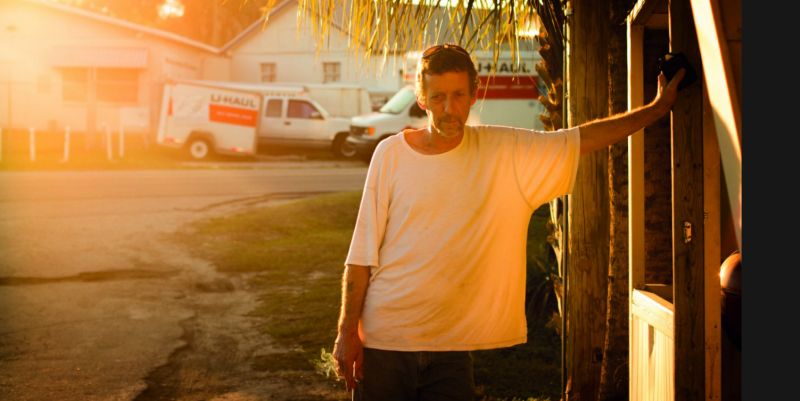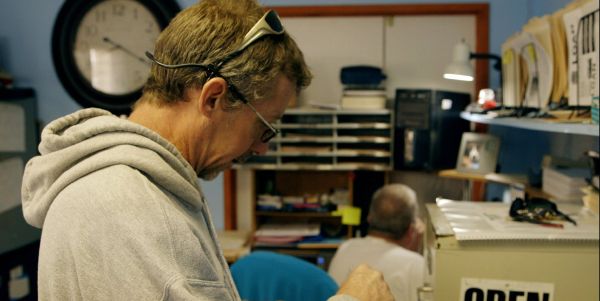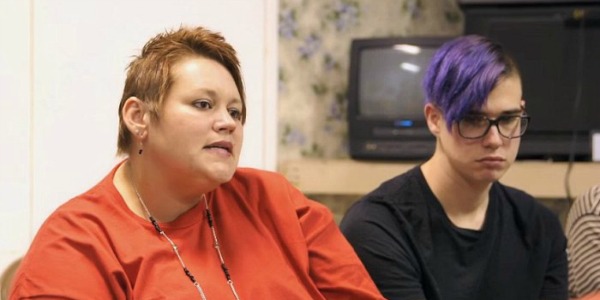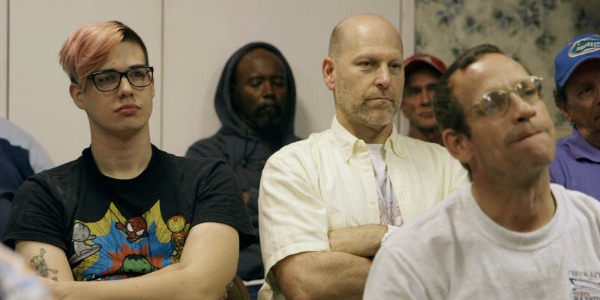PERVERT PARK: A Beautiful Depiction Of A Tragic Situation

Arlin is an all-around film person in Oakland, CA. He…
In the opening minutes of Pervert Park, we are introduced to a man recounting a story of loneliness and isolation, detailing how he had trouble building and maintaining relationships and finding his place in the world. It’s one of the most relatable narratives available, and the interview quickly builds a feeling of empathy.
That is until he utters the words “then I found this little girl” and we understand how easy it is to create a monster. In this opening interview, Pervert Park establishes the dichotomy we’ll be wrestling with throughout its run time: how a human and horror can simultaneously inhabit the same body.
Made by Swedish filmmakers Frida and Lasse Barkfors, the film examines the sex offender epidemic, which is made up of nearly a million Americans. Specifically, it focuses on St. Petersburg’s Florida Justice Transitions trailer park, which is uniquely situated away from schools, parks and the like to accommodate the living restrictions foisted upon sex offenders across the country. Residents are required to live in the park for the duration of their probation, thus forming one of the most uniquely dubious communities in the country.
Inclusivity For Outcasts
Pervert Park employs as a touchstone a group meeting conducted by therapist Don Sweeney, the only figure in the film who isn’t a sex offender. Shunned by society to the point where they live in the modern day equivalent of leper colony, surrounded by other sex offenders, is the only environment in which they feel safe and free to discuss their transgressions with openness and honesty.

In fact, all of the residents of FJT we meet reveal the nature of their crimes, perhaps partly because the viewer might be distracted by gnawing guesses otherwise. Whatever the reason, the amount of access offered by the film’s subjects is an act of bravery unto itself.
Documentaries tend to often take some stance on their subjects one way or the other; even with more Direct Cinema approaches where no judgements are explicitly stated, the footage chosen will likely lead the viewer in such a way that was intended by and aligns with the filmmaker. The subjects of Pervert Park are presented with an atypical degree of ambiguity that really forces the viewer to confront their own preconceived notions about sex criminals and the offenders registry.
Perhaps the most heartbreaking example of this manner of depiction is Tracy, who owns the film’s longest and arguably most impactful interview. Caught in a multi-generational cycle of abuse, Tracy inhabits the role of both victim and victimizer.

In doing so, she acts as an effective microcosm for many of the park’s residents: neglected, wanting for love and approval, and only able to find it with the vulnerable, trusting or non-threatening people who they would turn into victims.
A Deft Touch
Whether or not one agrees with the machinations and regulations of the sex offender registry, it is clear from Pervert Park that the residents have gained a clarity of perspective on their transgressions that only comes with prolonged intense introspection brought about by societal exclusion.
All of the figures in the film are apologetic, regretful and have come to recognize the events which led them to force themselves upon their fellow humans (if that was in fact the case. We meet one resident whose life has been forever altered as a result of a dubious craigslist sting that flirts with entrapment).

In the park they know no one has the right to judge them, but in sharing their stories with the camera, they are making themselves much more vulnerable than they already are, with their face and crime freely available for all to see. In doing so, Pervert Park acts as a cinematic “Grendel”, giving a voice to those whose feelings and opinions are rarely if ever considered.
It is important to note that we are never offered excuses or rationalizations, but reasons. Without blaming the victims or ignoring the perpetrators’ culpability, there are reasons why these horrible offenses occur with such regularity, including but not limited to a lack of basic sex education, and the first step to addressing the situation is to acknowledge the societal and environmental factors at play.
[easy-tweet tweet=”‘Pervert Park serves an essential function in illuminating underserved voices.'” user=”FilmInquiry” usehashtags=”no” template=”light”]In this way, the film exemplifies one of the ideal uses of the form: performing an essential function in illuminating underserved voices. It is an ideal version of the notorious “talking head” documentary, where the interviewees are more storytellers than reporters.
Beautifully shot and composed of rich environments to complement the complicated lives within, Pervert Park treats it subjects with the respect owed to anyone whom is willing to share their most intimate recollections with a documentary lens, despite their degree of monstrosity. It is the rare documentary that has the power to alter one’s preconceived notions about a topic as widely discussed as it is fraught, and accomplishes that feat with a remarkable amount of grace, artistry and restraint.
How do you feel about films where controversial opinions and experiences are presented? Do you feel it’s necessary the side of the perpetrator also needs to be illuminated?
Pervert Park airs tonight (July 11) on POV on PBS
Does content like this matter to you?
Become a Member and support film journalism. Unlock access to all of Film Inquiry`s great articles. Join a community of like-minded readers who are passionate about cinema - get access to our private members Network, give back to independent filmmakers, and more.
Arlin is an all-around film person in Oakland, CA. He received his BA in Film Studies in 2010, is a documentary distributor and filmmaker, and runs Drunken Film Fest Oakland. He rarely dreams, but the most frequent ones are the ones where it's finals and he hasn't been to class all semester. He hopes one day that the world recognizes the many values of the siesta system.













